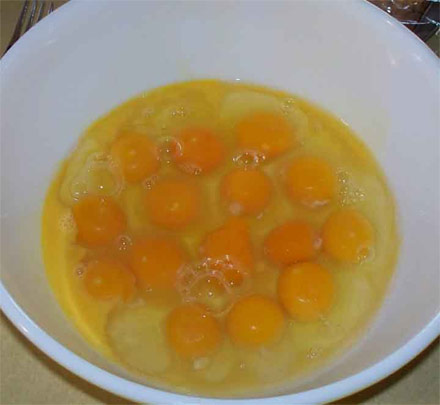
*Freezing Eggs*
By: Tinman
28 March 2012
Usually in the winter months, our 16 ladies lay an average of 4-6 eggs a day, which is just perfect for my wife and I for the week. Between baking and eating, that usually leaves a dozen to sell to one of our friends. This year, however, with the warmer weather, we were averaging between 10-14, and sometimes 16. It was not uncommon for us to have several dozen eggs at any one given time in our refrigerator.
After doing a little Web research and finding out how easy it was to freeze the eggs, we decided to give it a try. There were several storage methods out there, from just pouring the eggs into bags, to using ice cube trays. We chose the ice cube tray method. This way, we could just pull out as many as we needed and then reseal the bag. Each egg cube is approximately 1/2 of an egg.
I started by placing 15 eggs in a large bowl (See below). (At that time I didn't know that one cube was 1/2 of an egg, so I had a little left over.)

One of the things you want to try to avoid is having air bubbles in the eggs. In the next picture, you can see several bubbles that occurred from just dropping in the eggs. I just poked them with a fork. Then, with the same fork, I gently beat them into a light scramble, trying not to create more air bubbles.

There were few small bubbles, but those you couldn't help. They didn't show up in the cubes.
The next step was to place them in two freshly washed ice cube trays. Each tray makes 14 cubes, which would be a total of seven eggs for each tray.
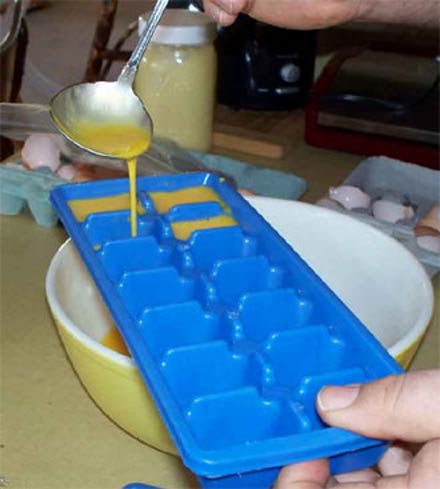
We used a large soup ladle to transfer the eggs to the ice cube trays. This seemed to remove pretty much all of the air bubbles. It was a little slow process, so I may try a turkey baster next time.
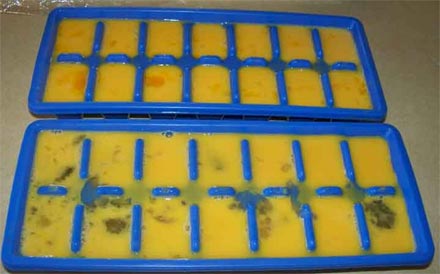
The lower tray was the last tray I filled. You can see that some of the egg whites didn't mix very well due to the light beating. But, overall, it didn't affect the egg turnout.
We then froze them overnight, roughly 24 hours.
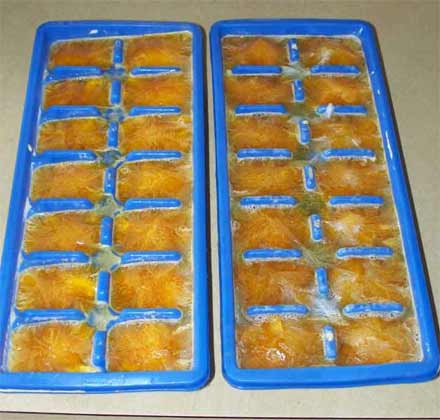
Below are the eggs just removed from the freezer. I tried turning the tray over and flexing the tray to remove them, but they wouldn't come out. I placed a strainer in the sink and ran a little hot water over the back side of the tray for about 5 seconds or so. Then they popped right out.
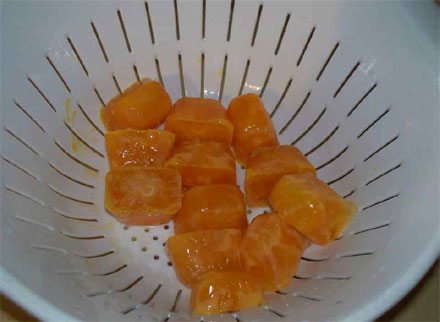
Don't they look just awesome? I love how rich and golden they look. The next step was to vacuum seal them up. We decided to seal them in batches of six, and a dozen complete eggs. (12 and 24 cubes)
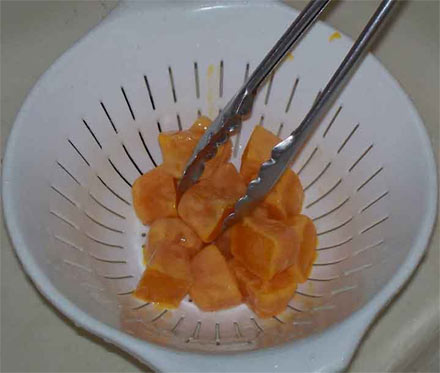
We removed the eggs from the strainer using hot dog tongs and placed them in the vacuum sealer bags. We then sealed them up. We used the normal setting (Dry). I wanted to see if the cubes would hold up to a full vacuum.
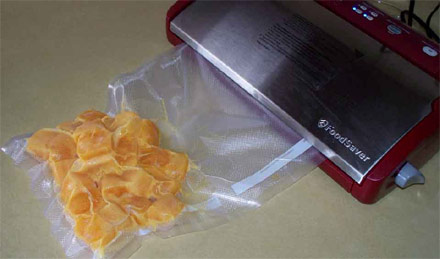
You can see here that they held up extremely well. We dated the bags and placed them back in the freezer. From everything that we have read, they should stay usable for up to a year. We have set aside four bags that we will open up, one in 30 days, 3 months, six months, and one year. This way, we will have our own FNV on freezer life, and report back to the group.
The recommended way to cook them was to pull the bags out a couple of hours before cooking and defrost. Or, place them in the refrigerator the night before. We decided to try a different method. We melted some of our canned butter on very low heat and just dropped in the cubes.
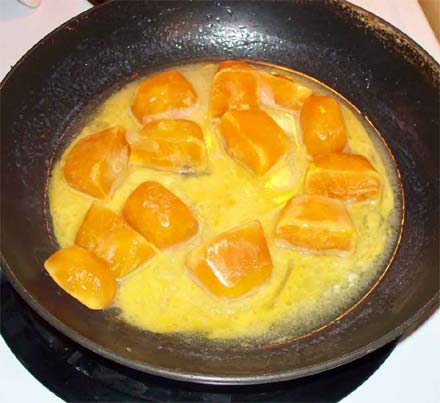
We kept the heat very low, so as not to start cooking the eggs. It took about six minutes. They were completely melted and not cooked. We then turned up the heat and cooked normally, and this is what we got...
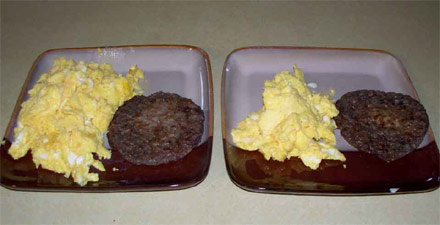
Ok, I added the sausage... lol...
But the eggs came out great! They were normal, and there was no difference in taste or texture from fresh eggs.
When I posted my initial trials on the Back to Basics boards there was some great feedback on how to use the eggs. One method for camping was to place the eggs in a boilable bag and store them in your ice chest. Then, when you want to use them, open up the bag and throw in your ham, cheese , onion, mushrooms or whatever. Then toss in a pot of boiling water for exactly 13 minutes. Out comes a perfectly cooked omelet. I haven't tried it yet, but it sounds great.
For those of you without chickens, you can do the same thing with store bought eggs.
Tinman
www.alpharubicon.com
All materials at this site not otherwise credited are Copyright © 1996 - 2012 Trip Williams. All rights reserved. May be reproduced for personal use only. Use of any material contained herein is subject to stated terms or written permission.